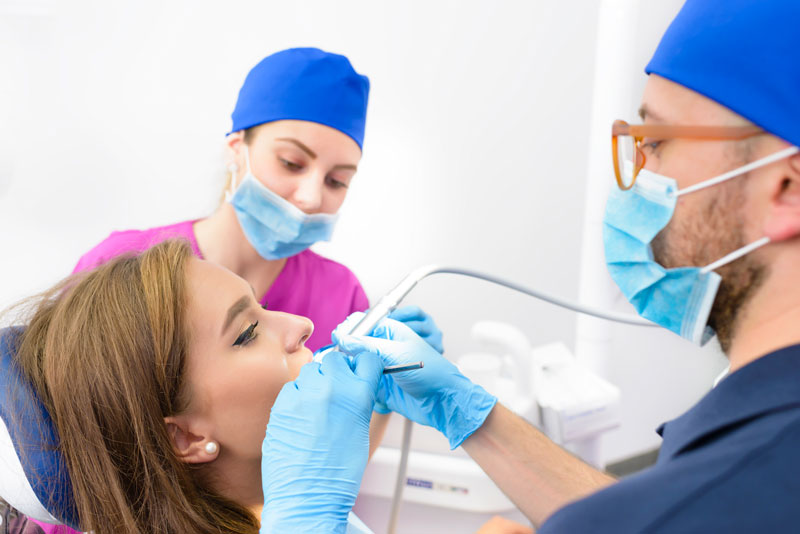The Importance of Oral Pathology

Pathology deals with the causes and effects of disease, and it plays a critical role in diagnosis and treatment of medical conditions. Oral pathology refers to the dental specialty of diagnosing and treating diseases in and around the mouth. This is key in identifying multiple diseases that can affect the mouth and surrounding areas, including face, head, neck, and jaw.
In this post, Des Moines Oral Surgeons PC explains why oral pathology is important and what you need to know about it, including:
- Types of oral diseases.
- Symptoms of oral diseases.
- What oral pathology screening entails.
- Importance of oral pathology screening.
- How oral pathology helps detect diseases in other areas of the body.
- What you need to know about oral cancer.
- Oral pathology screening in Des Moines.
Types of Oral Diseases
The most serious type of oral pathology is oral cancer. Many other conditions come under the umbrella of oral pathology, including:
- Gum disease (periodontal disease).
- Canker sores and cold sores.
- Abnormal bite (malocclusion).
- Thrush (candidiasis) – fungal yeast infection.
- Hairy tongue.
- Caries – dental cavities.
- Hand-foot-and-mouth disease (HFMD), with sores or ulcers clustered in the back of the throat.
- Strep throat.
- Salivary gland disease.
- Herpes simplex virus (HSV).
- Tonsillitis.
- Mumps.
- Burning mouth syndrome (BMS).
Symptoms of Oral Diseases
Signs that may indicate oral pathology include:
- Difficulty eating or swallowing.
- Whitish or reddish patches in the mouth.
- A sore that bleeds and doesn’t heal.
- A lump on the lining of the mouth.
- Persistent sore throat or hoarseness.
What is Oral Pathology Screening?
Oral pathology screenings are routine tests to evaluate the condition of soft tissues of the mouth, including:
- Gums
- Inside of the cheeks
- Tongue
- Palate (roof of the mouth)
- Lips
General dentists and oral surgeons look for abnormalities such as sores or white or red patches. For example, the inside of the mouth is lined with a mucous membrane that should be smooth and colored coal pink. Variations in this appearance could be a warning sign of a pathological process. Dentists and oral surgery specialists also examine oral tissues and the throat to check for lumps, thicknesses, or other irregularities. Sometimes, special lights or dyes are used to aid diagnosis.
Why Oral Pathology Screening is Important
Without oral pathology screening, early stages of oral diseases may go unnoticed, significantly reducing the likelihood of an optimal outcome from subsequent treatment. Oral pathology screening can identify various oral abnormalities. Many are benign and pose no risk to oral or overall health. Other pathologies are associated with systemic conditions that can damage health. Oral cancer is the most serious of these.
If your Des Moines oral surgeon finds a suspicious area of tissue that warrants further investigation, they’ll remove a sample and program a biopsy. Biopsies play a significant part in diagnosing oral pathologies. Without these tests in a lab, it’s impossible to reach an accurate diagnosis. Oral pathologists view the samples of tissues through microscopes and can determine the cause of abnormalities in cell structure.
How Oral Pathology Helps Identify Diseases Elsewhere in the Body
Oral pathology screening and routine dental checkups can spot problems in the mouth that point to health issues in other parts of the body as well as in the mouth itself – before you notice any symptoms. At the same time, oral diseases can negatively impact overall health of your body.
Diseases elsewhere in the body that may show symptoms in the mouth include:
- Compromised immune system
- Respiratory problems
- Heart conditions
- Diabetes
- Leukemia
Furthermore, oral thrush may be a sign of HIV – human immunodeficiency viruses – and erosion of teeth could indicate acid reflux. Oral diseases can also spread infection via the bloodstream to other parts of the body, including vital organs.
These oral pathologies include:
- Diseased, impacted wisdom tooth
- Dental abscess
- Gum disease
Oral Cancer
Oral cancer is one of the deadliest types of cancers, claiming the lives of thousands in the US every year. The American Cancer Society estimates more than 11,500 deaths from oral cavity cancer or oropharyngeal cancer in 2023.
Symptoms of Oral Cancer
Oral cancer usually begins as squamous cell carcinoma (SCC) in the thin cells lining the inside of the mouth and the lips. The disease can also start in the gums, tongue, or the roof or floor of the mouth.
Signs of oral cancer may include:
- Painful tongue, jaw, throat, or ears
- Difficulty eating
- Pain when swallowing
- Sore throat
- Bleeding in the mouth
- Facial numbness
- Loose teeth or dentures
Symptoms like these don’t necessarily indicate cancer and may be due to a less serious issue such as infection. The National Cancer Institute says cancer screenings are crucial before symptoms are apparent. The Oral Cancer Foundation recommends everyone aged 18-plus should get an annual oral cancer screening.
Can Oral Cancer Be Prevented?
There’s no proven way to prevent oral cancer. But you can reduce the risk if you:
- Practice good oral hygiene.
- Perform regular oral self-exams.
- Limit consumption of alcohol.
- Avoid tobacco use.
- Avoid excessive sun exposure to the lips.
- Get regular dental checkups and professional cleanings.
According to the World Health Organization (WHO), up to half of all cancers are preventable by doing things like:
- Eating fewer processed meats.
- Maintaining a healthy weight.
- Getting a human papillomavirus (HPV) vaccination.
Oral Pathology Screening in Des Moines
Oral pathology screening at Des Moines Oral Surgeons PC facilitates early detection of diseases in and around the mouth. Some of these conditions may be serious like oral cancer, others less so. We recommend regular oral pathology screenings and monthly oral self-examinations, during which sores or lumps should never be ignored.
It’s important to keep in mind that your mouth is one of the body’s most important warning systems as a marker for diseases elsewhere in your body, and that oral health contributes significantly to overall health. Diagnosing the early stages of oral disease allows for timely treatment that ensures the best outcome. Whether you’ve noticed any symptoms of oral health problems or not, it’s highly advisable to get a professional assessment. Contact us to make an appointment.











